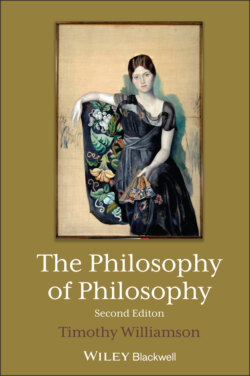The Philosophy of Philosophy

Реклама. ООО «ЛитРес», ИНН: 7719571260.
Оглавление
Timothy Williamson. The Philosophy of Philosophy
The Philosophy of Philosophy
CONTENTS
Guide
Pages
Preface to the Second Edition
Notes
Preface to the First Edition
Acknowledgments
Introduction
Notes
1 The Linguistic Turn and the Conceptual Turn
Notes
2 Taking Philosophical Questions at Face Value
1
2
3
Notes
3 Metaphysical Conceptions of Analyticity. 1
2
3
4
5
Notes
4 Epistemological Conceptions of Analyticity. 1
2
3
4
5
6
7
8
Notes
5 Knowledge of Metaphysical Modality. 1
2
3
4
5
6
7
Notes
6 Thought Experiments. 1
2
3
4
5
6
Notes
7 Evidence in Philosophy. 1
2
3
4
5
6
7
Notes
8 Knowledge Maximization. 1
2
3
4
5
6
Notes
Afterword Must Do Better
Notes
Appendix 1 Modal Logic within Counterfactual Logic
Notes
Appendix 2 Counterfactual Donkeys
9 Widening the Picture. 9.1 How Did We Get Here from There? The Transformation of Analytic Philosophy
I
II
III
Acknowledgments
9.2 Abductive Philosophy
Acknowledgments
9.3 Model-Building in Philosophy
What are Models?
Models in Philosophy
Methodological Reflections
Conclusion
Note
9.4 Morally Loaded Cases in Philosophy
Relativism
Skepticism
Internalism
Acknowledgments
9.5 Reply to Dennett and Kuznetsov on Abductive Philosophy
Acknowledgment
9.6 Reply to Kuznetsov and Stoljar on Model-Building in Philosophy
Acknowledgment
Notes
10 Experimental Philosophy. 10.1 Reply to Weinberg
Acknowledgment
10.2 Philosophical Expertise and the Burden of Proof. 1
2
3
4
5
6
Acknowledgments
10.3 On Joshua Alexander’s Experimental Philosophy: An Introduction
Acknowledgment
10.4 Philosophical Criticisms of Experimental Philosophy. 1. Introduction
2.“Philosophical Intuitions”
3. Proper Domains for the Application of Concepts
4. Further Questions about the Parity Defense
5. Acts of Judging and Evidence
6. Error-fragility
Acknowledgments
10.5 Reply to Dennett, Knobe, and Kuznetsov on “Philosophical Intuitions”
Acknowledgment
Notes
11 Naturalism. 11.1 Reply to Kornblith
Acknowledgment
11.2 Reply to Stalnaker
Acknowledgment
11.3 Reply to Bianchi
Acknowledgment
11.4 What is Naturalism?
Acknowledgment
11.5 The Unclarity of Naturalism
Acknowledgment
11.6 On Penelope Maddy’s What Do Philosophers Do? Skepticism and the Practice of Philosophy
Acknowledgment
Notes
12 Concepts, Understanding, Analyticity. 12.1 Reply to Jackson
Acknowledgments
12.2 Reply to Boghossian
Acknowledgment
12.3 Reply to Peacocke
1
2
Acknowledgment
12.4 Reply to Miščević
Acknowledgment
12.5 Reply to Smokrović
Acknowledgment
12.6 Reply to Trobok
Acknowledgment
Notes
13 Wittgensteinian Approaches. 13.1 Reply to Moore
Acknowledgment
13.2 Reply to Horwich
Acknowledgment
13.3 Reply to Frascolla
Acknowledgment
13.4 Reply to Marconi
Acknowledgments
13.5 Reply to Tripodi
Acknowledgments
13.6 On Paul Horwich’s Wittgenstein’s Metaphilosophy
Acknowledgment
Notes
14 Miscellany. 14.1 Reply to Ichikawa
Acknowledgments
14.2 Reply to Martin
1
2
Acknowledgments
14.3 On Robert Brandom’s Reason in Philosophy: Animating Ideas
Acknowledgment
14.4 On Peter Unger’s Empty Ideas: A Critique of Analytic Philosophy
Acknowledgment
14.5 Plato Goes Pop
Acknowledgment
14.6 Popular Philosophy and Populist Philosophy
Acknowledgment
Notes
Bibliography
Index
WILEY END USER LICENSE AGREEMENT
Отрывок из книги
Timothy Williamson
Second Edition
.....
Some reactions to the book made me wish that I had been more explicit about my terminology. For example, I often used the words “concept” and “conceptual,” but did little to define or clarify them. The reason was that I borrowed those words from my opponents, primarily to articulate their views and arguments – to the effect that philosophy is in some distinctive sense a “conceptual” activity. I wanted to be fair to my opponents by not defining or clarifying the terms in ways which they might reject. Moreover, such views of philosophy come in numerous sub-varieties, which gloss the words in different ways, as I acknowledged (17, this volume). Since the same forms of argument often worked against different sub-varieties, I used the words “concept” and “conceptual” in a somewhat schematic way, to avoid unnecessary repetition.
The upshot of Chapter 4 is that there are no “conceptual” truths or connections in any sense helpful to my opponents. If one likes, one can define a “concept” to be the actual or potential meaning of a linguistic expression, which it shares with all synonymous expressions, appealing to whatever standard of sameness in meaning is made available by a well-developed semantic theory. However, I argued that such a standard will be too coarse-grained to serve my opponents’ purposes. For example, it will not make even the most elementary logical truths “conceptual” in any distinctive sense. Such conclusions should have made it clear that “concept” and “conceptual” were not load-bearing terms in my statements of my own positive views.
.....